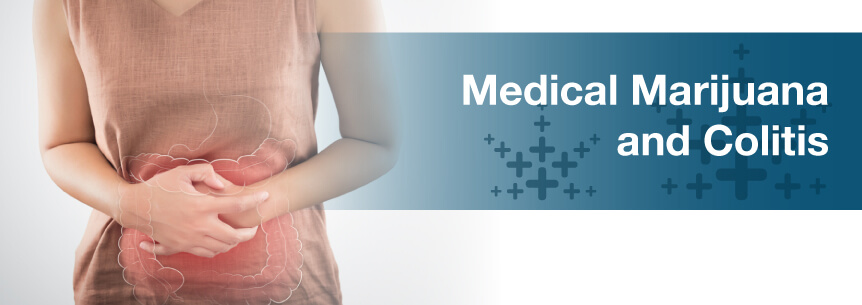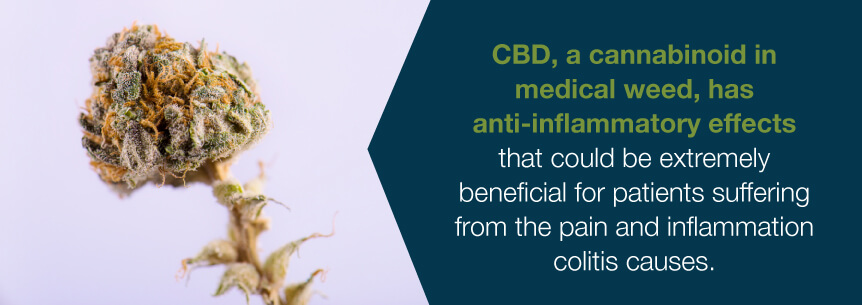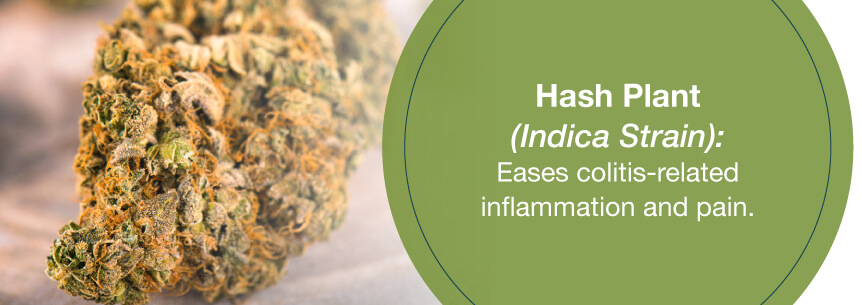
According to Florida Hospital, nearly one in every 1,000 Americans suffers from colitis, a condition affecting the rectum and colon and causing a wide range of unpleasant symptoms and side effects. While day-to-day life during a flare-up can prove challenging, there are ways to help you cope with colitis, including medical marijuana.
Colitis itself refers to inflammation in your colon. Because there are many different types of colitis, the symptoms often reveal the type of colitis patients have. Treatments will vary according to which variety of colitis you have.
Ulcerative colitis is the most common variety of the disease, affecting some 907,000 Americans. Symptoms may vary from person to person, but generally include one or more of the following:
Fortunately, most people with colitis experience mild to moderate symptoms. Some risk factors make certain people more likely to have colitis. These include the following:
You’ll have to visit your doctor to get a definitive diagnosis of colitis. Your physician may order blood tests, stool samples, X-rays, CT scans, flexible sigmoidoscopy or a colonoscopy to confirm a diagnosis of colitis.
The medical community has identified and labeled four primary types of colitis, each characterized by their causes.
Ulcerative colitis (UC) is the one doctors diagnose most frequently. UC is an inflammatory bowel disease. It’s one of only three conditions with this categorization — the others are Crohn’s disease and microscopic colitis. Ulcerative colitis is a lifelong condition that generally begins in the rectum before spreading to the colon, where it creates inflammation and bleeding ulcers.

Ulcerative colitis breaks down into distinct categories. These six are the most common.
Scientists believe UC occurs when your immune system overreacts to substances in your digestive tract, but they aren’t sure why it happens.
Pseudomembranous colitis is the result of an overgrowth of the Clostridium difficile bacteria. These bacteria typically live in your intestine without posing a problem. However, medications, like antibiotics, kill the beneficial bacteria in your intestine that keep Clostridium difficile in check. When this occurs, the release of toxins into the intestine causes inflammation.
Ischemic colitis (IC) is often the result of one or more underlying conditions causing the blood flow to the colon to stop suddenly. This halt in blood flow can be the result of blood clots, but the conditions below may also factor into instances of IC.
As its name implies, microscopic colitis (MC) is a condition requiring a microscope to identify. Two strains of microscopic colitis are collagenous colitis and lymphocytic colitis.
Each one affects the colon differently. Collagenous colitis involves the layer of collagen in the epithelium building up to become thicker than usual, while lymphocytic colitis presents with a higher-than-average count of white blood cells.
The causes of microscopic colitis are largely unknown, but scientists believe the following conditions may contribute:
There are other potential causes of colitis to consider. Though not as common as the causes mentioned above, the following may contribute to developing colitis:
If you suspect you have colitis, in any form, it is best to consult with your physician right away to seek treatment, rule out possible underlying causes and determine which type of colitis you have.
Sir Samuel Wilks was the first to coin the term “ulcerative colitis” in 1859, though we believe the condition dates back at least to as early as Roman times, where there are plenty of descriptions of colitis symptoms in contemporary literature. Historians believe ulcerative colitis represents the first subcategory of inflammatory bowel disease (IBD).
Ulcerative colitis can interfere with your daily activities, but it doesn’t have to. It is a chronic condition, which can take an emotional toll on the strongest people. Even if you aren’t symptomatic most of the time, you may experience constant worry or stress over recurring symptoms.
One of the biggest effects of colitis on sufferers’ daily life is the necessary lifestyle and dietary changes people with colitis must make to minimize the severity and frequency of symptoms recurring. However, these changes are entirely achievable, and many people find they feel better than ever after taking the necessary steps.
Even when you are symptomatic, you can still enjoy many of your normal activities, as long as you have access to bathrooms when you need them. Don’t let colitis keep you from the people and activities you love. Talk to friends and family, explain the situation and find practical solutions to keep you in action, even when your symptoms are flaring up.
Facts about colitis, according to the Crohn’s & Colitis Foundation, include:

While the condition may occur at any age, risk factors usually peak between the ages of 15 and 30 and over the age of 60, according to the National Institute of Diabetes and Digestive and Kidney Diseases.
Treatment for colitis varies according to the type of colitis you have and the severity of the symptoms you’re suffering. Some people have few intense symptoms, while others have severe and enduring symptoms.
For milder symptoms, your doctor may recommend the following:
Moderate to severe colitis symptoms may warrant stronger medication and treatment choices, including:
Sometimes, patients require treatment for the symptoms of colitis, like dehydration, electrolyte replacement, anemia and fever. Physicians prescribe these treatments on a case-by-case basis. Severe cases of colitis may require hospitalization.
For the most part, colitis represents an occasional, albeit painful, interruption to your daily routine. The symptoms may be unpleasant, but treatments can help you find relief. Also, there are plenty of communities online where you can find support, as well as helpful advice for living with colitis.
Recently, medical marijuana for colitis is offering promise for its benefits, including its anti-inflammatory effects.
A 2011 study found 51 percent of patients with ulcerative colitis are regular marijuana users. Thirty-three percent have used medical cannabis to treat their colitis symptoms.
According to the Crohn’s & Colitis Foundation of America Patient Education Committee, the endocannabinoids naturally found in your body could help limit intestinal inflammation. Endocannabinoids are molecules closely resembling the cannabis plant’s compounds.
IBD patients seem to have higher cannabinoid receptor levels in the tissue of their colon. Smaller studies indicate many IBD patients claim they smoke cannabis to relieve their symptoms of IBD, particularly patients who have a history of:

CBD, a cannabinoid in medical weed, has anti-inflammatory effects that could be extremely beneficial for patients suffering from the pain and inflammation colitis causes. After all, colitis is an inflammatory reaction within your colon, usually due to an infection or autoimmune response.
Marijuana cannot treat all cases of colitis. However, some research suggests medical marijuana can alleviate the symptoms of colitis that co-occurs with IBS. According to George Kunos and Pal Pacher of the National Institute of Alcohol Abuse and Alcoholism and the National Institutes of Health, cannabinoids can prevent abnormal movement in the large intestine. It can also prevent secretion and reduce inflammation, according to their research into cannabinoid testing.
As for the pain associated with colitis, there is ever-increasing evidence medical marijuana is a mild to moderate pain reliever in itself. There is also evidence it can work in conjunction with opiates to relieve chronic pain, while lowering the opiate dose necessary to relieve pain.
According to a study conducted at the University of California, San Francisco, when patients used medical marijuana with their prescribed opiates, they needed a lower dose of opiates in their bloodstream to produce the same pain-relieving effect. Other research has shown a moderate dose of medical marijuana can alleviate induced pain.
When it comes to nausea, vomiting, loss of appetite and weight loss, the evidence medical marijuana can treat these symptoms is staggering. These symptoms are some of the rare few for which the U.S. government has allowed medical marijuana treatment. As mentioned above, it is only allowed for specific conditions. However, there is no indication it does not work for other conditions. In fact, the evidence shows quite the opposite. Increased hunger and nausea alleviation are among the best-documented uses for medical marijuana.
Digestion, an international journal of gastroenterology, published a study showing patients who had three months of medical pot treatment experienced positive results in BMI and weight gain — good news for IBD patients who are regularly experiencing diarrhea and vomiting, resulting in weight loss and malnutrition. These patients also reported improvements in:
Dozens of other studies found cannabis serves an essential purpose in easing and treating painful IBD symptoms. It also relieves:
Medical marijuana for colitis may also relieve the following symptoms:
Some colitis medications cause lack of appetite, nausea and vomiting, which cannabis for colitis treatment helps relieve.
Medical weed, as mentioned, provides effective relief for serious symptoms like nausea, cramps and loss of appetite. Below are some top marijuana strains for your colitis symptoms:

You can research other potent cannabis and colitis strains here on MarijuanaDoctors.com.
Some therapeutic delivery methods of medical cannabis for colitis include:
If you’ve read enough about how marijuana for colitis can be a powerful treatment for your symptoms, don’t delay. Search our database for a list of doctors who are ready to write you your recommendation for medical cannabis.
You can also browse our list of medical marijuana dispensaries where you can buy your weed products. For tips on selecting the best dispensary, check out our “How to Choose a Dispensary Guide.”
We’ll be happy to answer any of your medical weed questions and help you find a marijuana doctor to get you started with treatment as soon as possible.
Find A Doctor Find A Dispensary